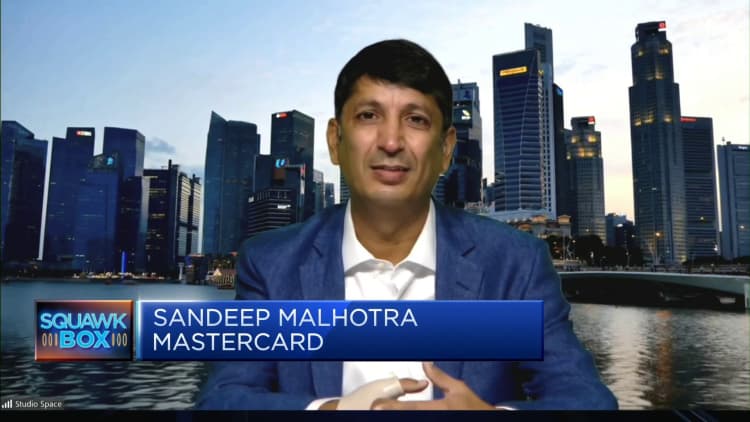Mobile Payment, Women, Contactless Payment,China – East Asia, Shanghai, 20-29 Years, Paying, Banking
Asia-pacific Images Studio | E+ | Getty Images
Southeast Asia is “supercharged” to power a shift toward digital payments and other innovations in digital services, thanks to an acceleration in digital transformation during the pandemic, said accounting and consulting firm PwC.
Widespread mobile ownership, together with rapid digitalization after the pandemic, helped spur the expansion of digital financial services in Southeast Asia, said PwC. The region is made up of Singapore, Malaysia, Thailand, Indonesia, the Philippines, Vietnam, Brunei, Laos and Cambodia.
Some examples include Thailand’s PromptPay, which enables bank account users to receive and send payments via national IDs, mobile numbers or email addresses. In the Philippines, the government distributed Covid-19 financial aid via digital platforms, while Singapore encourages and incentivizes hawkers to adopt contactless QR code payment services.
As more players enter the fray with new business models and the industry becomes increasingly fragmented, we see the fight to the top turning more intense.
“This enhanced availability and convenience of digital payments will see the bulk of the regional population leveraging mainstream digital financial products, such as e-wallets, further expediting the expansion of financial services,” said PwC.
Southeast Asia is poised for a strong growth potential with its digital economy set to reach $1 trillion by 2030 — backed by strong fundamentals including over 460 million digital consumers, young and tech-savvy populations, as well as rising internet penetration.
“As more players enter the fray with new business models and the industry becomes increasingly fragmented, we see the fight to the top turning more intense,” said PwC.
A digital wallet boom
Digital payments using e-wallets in Southeast Asia amounted to $22 billion in 2019 and are predicted to grow more than fivefold and exceed $114 billion by 2025, according to data cited by PwC.
“Given the convenience it provides, digital wallets have proven to be a natural breeding ground for super apps in Southeast Asia,” said PwC, pointing to the rise of Paytm in India and AliPay in China.
The digital wallet boom is partly driven by companies building super apps which often include their own e-wallet offerings such as WeChat and AliPay in China, Grab and GoTo in Southeast Asia, Careem in the Middle East, and Rappi and Mercado Libre in Latin America, an OliverWyman report said.
A super app is one single app that allows users to access multiple services from transportation or shopping, to payments and food delivery.

“Consumers are adopting digital financial services at a rapid pace. Cash is no longer king, as digital payments now make up more than 50% of the region’s transactions,” a recent Google, Temasek and Bain & Company report wrote.
“In some regions such as Southeast Asia, [digital payments via e-wallets] are already more common than physical card payments and set to dominate point-of-sale [systems] overall,” wrote Dan Jones and Alex Walker of OliverWyman.
Spurring growth
According to PwC, lowering the barriers to digitalization for merchants will drive digital financial services as the “majority of Southeast Asian businesses are small and medium-sized enterprises lacking necessary understanding of digital and its benefits while also unable to afford related transformation costs.”
PwC also predicts “aggressive investments by central banks to develop proof of concept for central bank digital currencies” in order to facilitate cross-border payments with lower transaction fees.
CBDCs are digital forms of fiat currencies issued by central banks.
Singapore’s central bank said in a 2021 report that cash is “generally incompatible” with the digital economy and the demand for cash as a means of payment is set to decline further.
“For digital payment services to make a bigger impact, a sharper focus on accessibility, simplicity and affordability is key, while overcoming the trust barrier. Moreover, industry players need to first understand the global megatrends re-shaping the future of payments, before beginning to future-proof their businesses,” said PwC.
 EU News Digest Latest News & Updates
EU News Digest Latest News & Updates


